人教版高中必修五Unit one
人教版高中英语必修5_unit_1_单词讲解
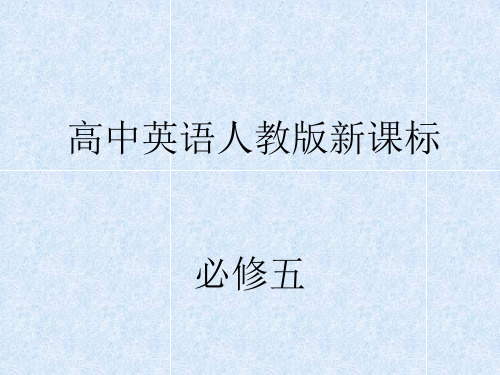
10. expose vt. 暴露,揭露, 使曝光 expose crime揭露罪行 expose the truth揭露真相 • expose sth./sb./oneself (to...) 暴露某事物/某 人/自己(给……) expose sb/sth 揭发某人/某事 be exposed to 暴露 expose…to…“把……暴露于……之下(之中), 使……受到……作用” expose a child to books exposed adj. 暴露的,暴露于风雨中的,无掩蔽的 exposure n. [u]暴露;揭露,揭发 expose one’s skin to the sun 使皮肤暴露于阳光下
• take part in 指参加会议或群众性活动等, 着重说明句子主语参加该项活动并在活动中 发挥积极作用。 • We'll take part in social practice during the summer vacation. 暑假期间我们将参加社 会实践。 • take part in是惯用词组,part前一般不用冠 词,但part前有形容词修饰时,要用不定冠 词。Lincoln took an active part in polities and was strongly against slavery. 林肯积极 参加政治活动,强烈反对奴隶制。
vt. 治愈;治疗
curable adj. 可治愈的 a cure for... 针对……的治疗 cure sb. of sth. 改正某人的坏习惯;治愈某人的疾病
• 区别cure/treat/heal (1)treat指通过药物、特别的食品或运动治病,强 调治疗过程,不一定治好。
• treat sb. for sth.医治某人的病;还可作“对 待,看待”讲,treat...as把……看作/视为。 (2)cure意为“治愈,痊愈”,特别指病后的恢
人教版新课标高中英语 必修五 Unit 1 Great scientists Writing 配套练习 含答案详解

Unit 1Great scientistsWritingⅠ.基础写作专练:根据句意完成句子, 注意连接词的正确使用1., there is a museum near the theatre.另外, 在这家剧院附近有一家博物馆。
2.Through these websites, I can read some classic English passages, poems and stories. , I can learn some learning skills and methodologies, which play an important part in my study process.通过这些网站, 我可以阅读一些经典的英语文章、诗歌和故事。
更多的是, 我可以学会一些学习技能和方法, 它们在我的学习过程中起着重要的作用。
3., it was harder than we had expected.然而, 这比我们所期望的要更难。
4., I took many falls off the bike.更糟糕的是, 我总是从自行车上摔下来。
5., we should learn how to get along well with others.另外, 我们应该学会怎样和他人很好地相处。
6.In our school, , things are quite different.然而在我们学校, 情况却完全不一样。
7.I think we will have a good time there I will send you photos taken there.我想我们在那里会玩得很愉快, 而且我将会把在那里拍的照片发送给你。
8., do let me know if you need more information.另外, 如果你需要更多的信息, 一定要告诉我。
9.He was tired, he kept working.他累了, 可是他还继续工作。
人教版必修五unit1动词过去分词作定语和表语

a snow-covered city
what kind of water can we drink?
• boiling water • boiled water
• the bridge built • the bridge being built • the bridge to be built
5. Most of the artists _____ to the party were from South Africa. (’90NMET) A. invited B. to invite C. being invited D. had been invited
6. As soon as she entered the room, the girl caught sight of the flowers ____ by her mother. (’93上海) A.buying B. being bought C. were bought D. bought
• 一、翻译并把它们变为过去分词 • boil pollute borrow break • Answer:煮,污染,借,打碎/打破
• • • • • • 二、翻译 煮沸的水 被污染的水 借来的书 打碎的花瓶 动词分词可以做什么成分??
• • • • • •
译 A used stamp A fallen leaf An injured finger The phone made in Japan The girl dressed in white dress
air
Tibetan goats
building s
shoe
Use –ed forms to finish the story
人教版高中英语必修五book5 unit1 reading知识点

11
注意:
immediately, the moment, directly, instantly 等 与 every time一样,都可以用作连词引导时间 状语从句,意为 “一…..就”。
e.g. I will give the letter to him immediately I see him.
1
1.Who put forward a theory about black holes. 谁提出了黑洞理论
put forward (1) 提出(+表示建议,计划等的名 词)= come up with
e.g. put forward a very good suggestion/plan 提出了一个很好的建议 /计划
Smith. 昨天我们看见的那个人是史密斯先生. 7
(2) expose ① 使暴露于;使接触到 expose sth/sb to 使…暴露于…;使面临;
使遭受(危险,攻击等) be exposed to 招致,遭受 翻译:呆在户内,别把你的皮肤暴露于太阳底下 Keep indoors and don’t expose your skin to the sun.
8
5.deadly (1) adj. 致命的,致死的;毒性的 e.g. This is a deadly poison. 这是一种致命的毒药。 (2) adv. ①死一般地 e.g. His face was deadly pale. 他的脸死一般地苍白。 ② 非常,极度地 e.g. The air was deadly cold. 空气极度寒冷。
(2) 把...向前拨
人教新必修五Unit1 Period Threre 课件
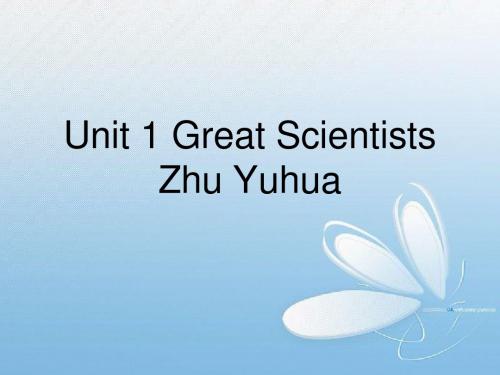
put 相关短语
put…into practice put aside put up 建立;建造 put away put back put down put off put on 把„„付诸实施 不理睬,忘记 put up with… 忍受…… 积蓄,攒钱 将„放回;施延,向后拔 镇压;写下;记下 推迟 穿上;上演;增加(体重)
• cure n.& v. 治愈;痊愈治愈; 治疗
可构成cure sb.of sth. 句型
control of • The driver lost __________his car and it knocked into a tree. 司机对车失去控制,车撞到树上。 out of control • The car was ___________and ran into a wall.车失去控制,撞到了墙上。 in control of • Mr Brown is ___________the in the control of shop./The shop is ___________Mr Brown. 布朗先生管理这家商店。 under the control of • The money is _______________Mr Brown.钱财由布朗先生掌管。
Unit 1 Great Scientists Zhu Yuhua
language points
the way of doing sth.= the way to do … “做…..的方法”
She showed us the way of cleaning it. = She showed us the way to clean it. 她给我们示范清洗它的办法.
高中英语人教版必修五unit1单词讲解与拓展
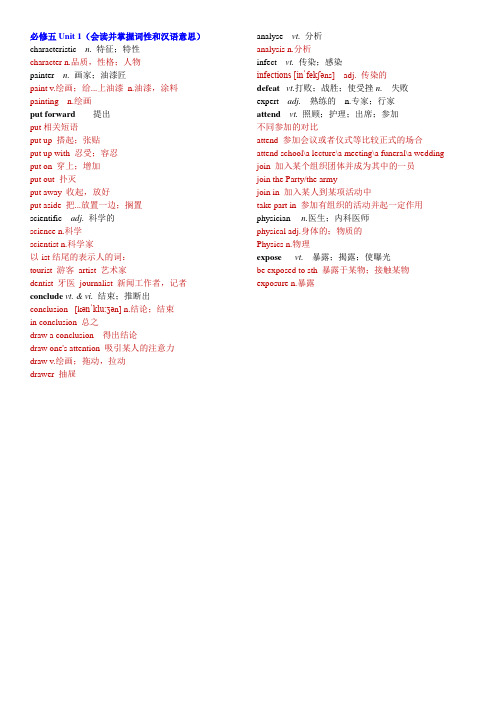
必修五Unit 1(会读并掌握词性和汉语意思)characteristic n.特征;特性character n.品质,性格;人物painter n.画家;油漆匠paint v.绘画;给...上油漆n.油漆,涂料painting n.绘画put forward 提出put相关短语put up 搭起;张贴put up with 忍受;容忍put on 穿上;增加put out 扑灭put away 收起,放好put aside 把...放置一边;搁置scientific adj. 科学的science n.科学scientist n.科学家以-ist结尾的表示人的词:tourist 游客artist 艺术家dentist 牙医journalist 新闻工作者,记者conclude vt. & vi. 结束;推断出conclusion [kənˈklu:ʒən] n.结论;结束in conclusion 总之draw a conclusion 得出结论draw one's attention 吸引某人的注意力draw v.绘画;拖动,拉动drawer 抽屉analyse vt. 分析analysis n.分析infect vt. 传染;感染infections [inˈfekʃəns] adj. 传染的defeat vt.打败;战胜;使受挫n. 失败expert adj. 熟练的n.专家;行家attend vt. 照顾;护理;出席;参加不同参加的对比attend 参加会议或者仪式等比较正式的场合attend school\a lecture\a meeting\a funeral\a wedding join 加入某个组织团体并成为其中的一员join the Party/the armyjoin in 加入某人到某项活动中take part in 参加有组织的活动并起一定作用physician n.医生;内科医师physical adj.身体的;物质的Physics n.物理expose vt. 暴露;揭露;使曝光be exposed to sth 暴露于某物;接触某物exposure n.暴露deadly adj. 致命的die v.死dead adj.死去的death n.死亡cure n. 治愈;痊愈vt. 治愈;治疗a cure for 治疗...病的方法cure sb. of sth 治好某人的病对比treat 治疗(过程,不强调结果);款待outbreak n. 爆发;发作break out 爆发(多指战争或火灾)challenge n. 挑战vt. 向……挑战challenging adj.挑战性的victim n. 受害者absorb vt. 吸收;吸引;使专心absorb oneself in sthsb be absorbed in sth 全神贯注于absorbed adj.全神贯注的suspect vt.怀疑n. 被怀疑者;嫌疑犯sb. be suspected of doing sth. 某人被怀疑做了某事enquiry n. 询问enquire v.询问也写作inquiry, inquire neighbourhood n. 附近;邻近neighbour n.邻居severe adj.严重的;剧烈的;严厉的clue adj. 线索;提示pump n. 泵;抽水机vt. (用泵)抽(水)foresee vt. 预见;预知investigate vt.&vi. 调查investigation n. 调查blame vt.责备;谴责n.过失;责备blame sth. on sb. 把某事怪到某人头上blame sb. for sth. 因为某事责备某人sb. be to blame 某人应受责备get/accept/bear/take the blame for...对...负责pollute vt. 污染;弄脏pollution n.污染polluted adj.受污染的handle n. 柄;把手vt. 处理;操纵germ n.微生物;细菌link vt. & n. 连接;联系link…to… 将……和……联系或连接起来sth. be linked to 某物被连接到.... announce vt. 宣布;通知announcement n.宣布,通告certainty n.确信;确实certain adj.确信的certainly adv.当然instruct vt. 命令;指示;教导instructor n.导师,指导者instructions n.说明书,用法说明=directions responsible adj. 有责任的;负责的be responsible for n.对...负责responsibility n.责任a sense of responsibility 责任感construct vt.建设;修建construction n. 建设;建筑物under construction 在建设中contribute vt. & vi. 捐献;贡献;捐助contribute to... 有助于,导致contribution n.贡献;捐款make contributions to...为...做贡献apart from 除……之外;此外firework n. 烟火(燃放)chart n. 图表creative adj.有创造力的;创造性的create v.创造creativity n.创造力,创造性co-operative adj.合作的co-operation n.合作operate v.操作,运转;做手术operation n.s手术;运转,运行positive adj. 积极的;肯定的;确实的反义词negative adj. 消极的(be)strict with sb.…对……严格的(be)strict in sth. 在...方面严格的revolutionary adj.革命的;重大变革的revolution n.革命movement n. 移动;运动;动作move v.移动;运动moved adj.感动的make sense 讲得通;有意义make no sense 无意义sense v.&n. 感觉;感官a sense of ... ....感a sense of humor / responsibility幽默感/责任感sensitive adj.敏感的backward adv. & adj. 向后地(的);相反地(的);退步地(的)forward 向前的put forward 提出look forward to doing sth.期望做某事loop n. 圈;环privately adv. 私下地;秘密地private adj.私下的;秘密的privacy n.隐私spin vi. & vt. (使)旋转;纺(线或纱)brightness n.明亮;亮度;聪颖bright adj.明亮的brighten v.使明亮-ness后缀的名词happiness, kindness, darkness, loneliness, sadness-en后缀的动词strengthen,widen,brighten,broaden,weaken,sharpe n,shorten enthusiastic adj. 热情的;热心的be enthusiastic about 对...热情的enthusiasm n.热情cautious adj. 小心的;谨慎的caution n.小心;谨慎reject vt.拒绝;不接受;抛弃rejection n.拒绝,否决表示拒绝的短语refuse to do sth.object to doing sth.be opposed to doing sth.universe n. 宇宙;世界universal adj.普遍的,全体的。
人教版英语必修五unit 1建议信

例文
• 假设你是李华,你的好友李明在交友 过程中遇到了困难。请你根据以下提示 用英语给他写一封信,给他提出一些建 议。 • 1.帮他分析原因。 2. 给他提出建议 • 3. 陈述你帮助他的具体打算。 • 4.100个词左右。
第一步:审题
养成重视审题的习惯。虽然基础写作题是半封闭性的,但 审题仍然十分重要。现以样题为例,谈谈如何审题:
【常用句型 】模板
Para1 1. I’m writing to persuade/advise you not to…. 我写信是要劝你… … 2. I am writing to express my views about… 我写信来是要表达我关于… …的想法
Para2 1. If I were you, I would…. 如果我是你, 我会… … 2. It seems to me that you could… 我认为你可以… … 3. First of all, I think it would be better if …. 首先,我想如果你能… …会更好 4. I think it would be more beneficial if you could… 我想如果你能… …会更有利… …
(8).和…交朋友
make friends with
2. 句式练习 一句多译
(1).你在信中说,你与别人交流时有困难。 A.In your letter, you said you were not good at communicating with others.
B. In your letter, you said you had difficulty/trouble in communicating with others.
高中英语Unit 1 Great scientists 人教版必修五
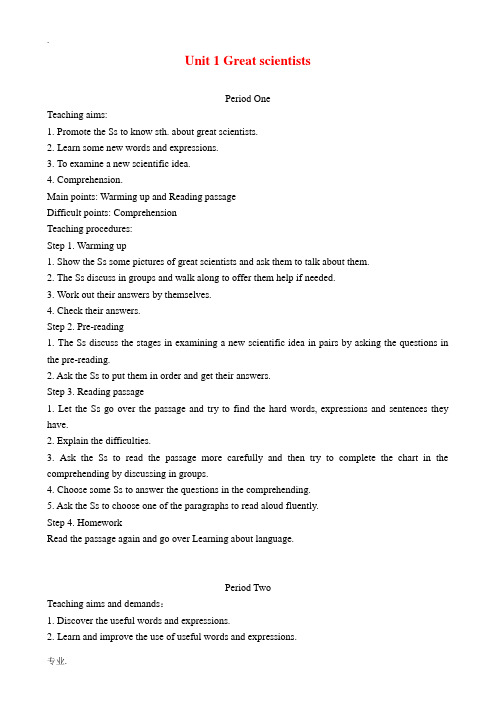
Unit 1 Great scientistsPeriod OneTeaching aims:1. Promote the Ss to know sth. about great scientists.2. Learn some new words and expressions.3. To examine a new scientific idea.4. Comprehension.Main points: Warming up and Reading passageDifficult points: ComprehensionTeaching procedures:Step 1. Warming up1. Show the Ss some pictures of great scientists and ask them to talk about them.2. The Ss discuss in groups and walk along to offer them help if needed.3. Work out their answers by themselves.4. Check their answers.Step 2. Pre-reading1. The Ss discuss the stages in examining a new scientific idea in pairs by asking the questions in the pre-reading.2. Ask the Ss to put them in order and get their answers.Step 3. Reading passage1. Let the Ss go over the passage and try to find the hard words, expressions and sentences they have.2. Explain the difficulties.3. Ask the Ss to read the passage more carefully and then try to complete the chart in the comprehending by discussing in groups.4. Choose some Ss to answer the questions in the comprehending.5. Ask the Ss to choose one of the paragraphs to read aloud fluently.Step 4. HomeworkRead the passage again and go over Learning about language.Period TwoTeaching aims and demands:1. Discover the useful words and expressions.2. Learn and improve the use of useful words and expressions.Main points: Learn to use the words and expressions that the Ss discover.Difficult points: Improve the use of the words and expressions.Teaching procedures:Step 1. Learning about language1. Discover the useful words and expressions in this unit in groups of four.2. Ask the Ss to show their results to the class.3. Ask them to study the words and expressions in Ex.1.4. Ss have a discussion and do the exercises.5. Check their answers.6. Change the verbs into nouns and make sentences by using “make a …〞Step 2. Using words and expressions1. Make sure the Ss know the words and expressions.2. Let the Ss work in groups to complete the blank in Ex.1.3. Check their answers.4. Do the translations. Ss discuss the sentences and the translate them into English, using the words and phrases in brackets.Step 3. Words learning1. Show the Ss a list of prefixes to talk about them.2. Ask them to work in groups to find some words with the prefixes and study their meanings.3. Let them show their results to the class.4. Walk around the class to give them help if needed.Step 4. Study the use and meanings of suggest1. Study the meaning of suggest by looking the dictionary entry.2. Match the meanings with the sentences on the right in Ex.4.3. Check their answers.Step 5. HomeworkTeaching aims and demands:1. Discover the useful structure.2. Learn to use the grammar of past participle.3. Enable the Ss understand the past participle using as attribute and predicative.Main points: Learn the usage of the past participle using as attribute and predicative.Difficult points: Use the useful structure.Teaching procedures:Step 1. RevisionReview the past participle of some verbs.Step 2.1. Look at the chart and study the phrases.Past participle as the attribute and the predicative(1) terrified people(2) reserved seats(3) polluted water(4) a crowded room(5) a pleased winner(6) children who look astonished(7) a vase that is broken(8) a door that is closed(9) the audience who feel tired(10) an animal that is trapped3. Ask the Ss the following questions:(1) What kind of words before the past participles?(2) What kind of words after the past participles?4. Ask the Ss find the sentences using the past participle in the reading passage.5. Ss have a discussion and complete the chart with the same meaning of the phrases above.6. Ss show their results to the class.7. Complete the sentences in Ex.3.Step 3. Using structure1. Make sure the Ss know the words and the discuss in groups to finish the sentences using past participle.(Ex.1)2. Rewrite the sentences into one sentence using the past participle as the attribute or predicative.3. Check their answers.Step 4. HomeworkWrite down 1, 3, 5, 7 of Ex.2 in the exercise book.Period FourTeaching aims and demands:1. Improve the Ss listening skills.2. Know more about great scientists.Main points: Listening and speakingDifficult points: Get to know the information of listening materials.Teaching procedures:Step 1. Listening and speaking1. Listen to the tape and answer the questions.(1) What did Qian Xuesen study first?(2) What experience did he get in America that was very useful for China?(3) What was Qian Xuesen’s achievement when he returned to China from America?(4) How has he been honoured in China?(5) How did Steve honour him?Step 2. Speaking1. Ss discuss what scientific job they will do in the future in pairs by using the questions and expressions on Page 6.2. Ask some Ss to talk in class.Step 3. Listening and talking1. Play the tape for the Ss to listen and finish the exercises in the workbook, pause from time to time if needed.2. Check their answers.3. Work in pairs. Imagine you are going to meet a specialist about a newly-found flower by using the useful sentences on Page 42.Step 4. Listening task1. Play the tape for the Ss to get the information of the listening task.2. Check their answers.Step 5. HomeworkPrepare the reading task.Period FiveTeaching aims and demands:Improve the Ss reading skills and their talent in getting the information.Main points: Reading and reading taskDifficult points: Finding the Euler path.Teaching procedures:Step 1. RevisionRevise the past participle used as the attribute and predicative.Step 2. Reading1. Ss read the passage as fast as they can and then draw the two theories of the universe in groups.2. Ask the Ss to show their pictures to the class.3. Ss read the passage again and find the problems they have.4. Solve the Ss’ problems.5. Discuss in pairs. If you were Nicolaus Copernicus, would you have hidden your theory for so many years? Why?6. Choose some Ss to share their ideas to the class.Step 3. Reading task1. Ss read the passage and answer the following questions.(1) What is odd point? (2) What is even point? (3) What rule did Euler find?2. Ss discuss in groups and try to find the answers.3. Teacher walks around to offer them help.4. Use the rule to see if you can go over the diagram, not missing any points or going over any line twice.( See figures on Page 46)5. Ss work in groups.Step 4. HomeworkWrite a short passage about Copernicus.Period SixTeaching aims and demands:1. Try to write sth persuasive.2. Learn to write a report about people.Main points:Make a plan in discussion.Difficult points:Write a passage / a report.Teaching procedures:Step 1. Writing1.Ask the Ss to read the passage again and gather some information about Copernicus.2. Plan to write a letter.Step 2. Writing taskWrite a report about your scientist, his/her life, achievements and the key to his/her success.1. Before you begin to write, remember to put your information under three headings: life, achievements and key to success.2. Plan your report like the one on P47.3. Ask them to read their plans.4. Begin to write the report.Step 3. HomeworkComplete the report and write down on the exercise book.。
人教版英语必修五 Unit 1 Using Language

水星 金星 地球 火星 木星 )
Mercury Venus Earth Jupiter Saturn Uranus Neptune Pluto Mars
Can you use a good method to memorize them ?
Before you listen to the tape,
look at the screen and read the new
words in the material :
astronomer (天文学家)
astronaut (宇航员)
institute (研究所)
2 Listen to Parts 1 and 2 of the
YP: Well, he first studied at university to
be an engineer. Later he went to America to study for his doctor’s degree. It was then he began to work on rockets. SS: So it was lucky for our space programme that he came back to
2. Can you name the nine planets in the solar system?
Nine Planets In .
the Solar System
Mercury Venus Nine Planets Earth In the Solar Mars Jupiter System: Saturn Uranus Neptune Pluto
Unit1
Using Language
人教版高中英语必修五重点单词短语
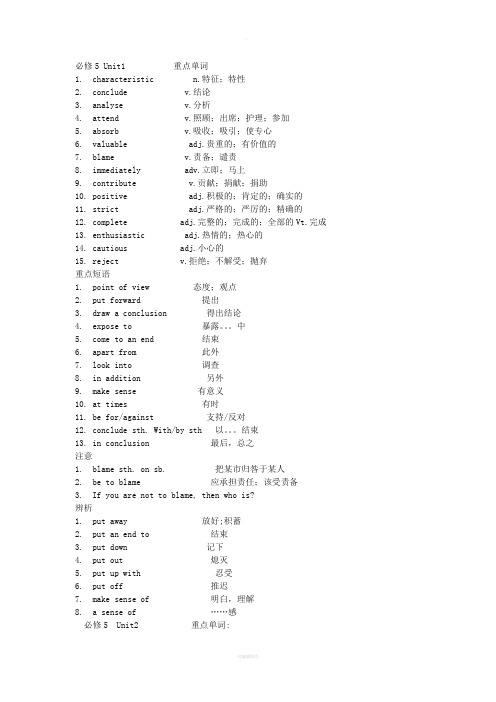
必修5 Unit1 重点单词1. characteristic n.特征;特性2. conclude v.结论3. analyse v.分析4. attend v.照顾;出席;护理;参加5. absorb v.吸收;吸引;使专心6. valuable adj.贵重的;有价值的7. blame v.责备;谴责8. immediately adv.立即;马上9. contribute v.贡献;捐献;捐助10. positive adj.积极的;肯定的;确实的11. strict adj.严格的;严厉的;精确的12. complete adj.完整的;完成的;全部的Vt.完成13. enthusiastic adj.热情的;热心的14. cautious adj.小心的15. reject v.拒绝;不解受;抛弃重点短语1. point of view 态度;观点2. put forward 提出3. draw a conclusion 得出结论4. expose to 暴露。
中5. come to an end 结束6. apart from 此外7. look into 调查8. in addition 另外9. make sense 有意义10. at times 有时11. be for/against 支持/反对12. conclude sth. With/by sth 以。
结束13. in conclusion 最后,总之注意1. blame sth. on sb. 把某市归咎于某人2. be to blame 应承担责任;该受责备3. If you are not to blame, then who is?辨析1. put away 放好;积蓄2. put an end to 结束3. put down 记下4. put out 熄灭5. put up with 忍受6. put off 推迟7. make sense of 明白,理解8. a sense of ……感必修5 Unit2 重点单词:1. unite vi.&vt. 联合;团结2. consist vi 组成;一致3. divide vt 分配;分开4. puzzle n 难题;谜 v. 使迷惑5. clarify vt. 澄清;阐明6. relation n.关系;联系7. legal adj.发律的;合法的8. convenience n. 便利;方便9. attraction n. 吸引力;吸引;吸引人的事物10. collection n. 收藏品;珍藏;收集11. construct vt. 建造;构造;创立12. influence vt. 影响;改变 n.影响;势力;有影响力的人13. project n. 课题;计划;工程14. arrange vt. 筹备;安排;整理15. wedding n 婚礼16. fold vt 对折;折叠17. sightseeing n 观光;游览18. available adj 可利用的;可用到的;有用的19. delight n 快乐;高兴;喜悦 vt 使高兴20. uniform n 制服21. spending adj 壮丽的;辉煌的22. statue n 塑像;雕像23. thrill adj 使激动24. unfair adj 不公平的;违反规则的25. smart adj 漂亮的;聪明的26. suggestion n 建议;意见重点短语1. consist of 由……组成2. to one’s surprise 令某人吃惊的是3. break away from 脱离;脱掉4. leave out 省去;遗漏5. make a list of 把……列出清单6. in memory of 为纪念……7. feel proud of 对……感到骄傲8. divide into 把……分成9. refer to 说到10. on special occasions 在特殊的场合11. take the place of 代替12. break down 损坏必修5 Unit3 重点单词:1. vehicle n.交通工具;车辆2. carriage n.四轮马车;客车3. mud n.泥;泥浆4. bathroom n.浴室;盥洗室5. temple n.庙宇;寺院6. private adj.私人的;私有的7 .location n.位置;场所8. settlement n.定居;解决9. impression n.印象;感想;印记10. constant adj.时常发生的;连续不断的11. constantly adv.不断地12. remind v.提醒;使想起13. jet n.喷气式飞机14. previous adj.在前的;早先的15. tablet n.药片16. capsule n.太空舱;胶囊17. Opening n.(出入的)通路;开口;开端18.surrounding n.周围的事物;环境 adj. 周围的ck v.缺乏;没有 n.缺乏;短缺的东西20.ache v & n.痛;疼痛21.mask n.面具;面罩;伪装22. Bend v.(使)弯曲23.press v.按;压;逼迫 n.按;压;印刷;新闻24. swift adj.迅速的;快的;敏捷的25. swiftly adv.迅速地;敏捷地26. master v.掌握;精通;征服;控制 n.主人;师傅;能手27. sight n.视力;视觉;见28. Flash v.(使)闪光;(使)闪现29. switch v.转换 n.开关;转换30. optimistic adj.乐观的;乐观主义的31. pessimistic adj.悲观的;厌世的32. opportunity n.机会;时机33. length n.长度;长34.alien adj.陌生的;外国的;外星的 n.外国人;外星人35. enormous adj.巨大的;庞大的36. imitate v.模仿;仿造37. extraordinary adj.特别的;非凡的38. extraordinarily adv.格外地;特别地39. helmet n.头盔;钢盔40. assist v.援助;帮助;协助41. agency n.代理;中介;代理处42. skip v.跳;蹦43. require v.需要;要求;命令44. cocoa n.可可豆;可可粉;可可饮料45. lemonade n.柠檬水46. herb n.药草;香草重点词组:1.take up 拿起;接受;开始;继续2.in all directions 向四面八方3. lose sight of 不再看见......4. remind of 使……回想起或意识到……5. in no time 立刻,立即6. sweep up 打扫;横扫7. assist in 帮助;援助;协助8. depend on 依靠,依赖9. catch sight of 瞥见……10. speed up 加速11. A lack of ……的缺乏必修5 Unit4 重点单词1. occupation n.职业;占有2. profession n.职业;专业3. photograph n.照片; vt.给……照相4. eager adj.渴望的;热切的5. concentrate vt.集中;聚集6. course n.过程;进程;课程;一道菜7. acquire vt.获得;取得;学到8. meanwhile adv.其间;同时9. trade n.行业;贸易;商业10. case n.情况;病例;案例11. accuse vt.指责;谴责;控告12. deliberately adv.故意地13. guilty adj.犯罪的;有罪的;内疚的14. technical adj.技术(上)的;技巧方面的15. thorough adj.彻底的;详尽的16. gifted adj.有天赋的17. defend vt.防护;辩护;护卫18. crime n.罪行;犯罪19. normal adj.正常的;正规的;标准的20. seldom adv.很少;从不21. edition n.版本;版;版次22. accurate adj.精确的;正确的23. employ vt.雇用;使用24. polish vt.擦亮;磨光;润色25. note vt.特别提到;注意;记下26. chief adj.主要的;首席的 n.首领;长官27. approve vt.赞成;称许;批准28. process n.过程;程序;步骤29. intention n.意图;目的;打算30. appointment n.约会;任命31. senior adj.年长的;高年级的;高级的重点短语1. on one’s own 独自;独立2. be eager to do sth 渴望于……3. concentrate on 全神贯注于4. accuse…of 因……指责或控告……5. go on a story 去采访6. cover a story 采访/报道7. make sure 确定;查明;弄明白;确保8. ahead of time 提前9. have a good “nose” for sth 探查发现某事物的能力24. be supposed to 应当;认为必须25. defend against 防卫以免于必修5 Unit5 重点单词1. aid n.&vt.帮助;援助;资助2. injury n.损伤;伤害3. bleed vi.&vt.(bled, bled)流血4. choke vi.&vt.(使)噎住;(使)窒息5. blood n.血;血液;血统6. burn vi.&vt.(被)烧毁烧伤;(被)烫伤n.烧伤或灼伤(的痕迹)7. organ n.器官8. poison n.毒药;毒害 vt.毒害;使中毒9. treatment n.治疗;处理;对待10. radiation n.辐射;射线11. mild adj.轻微的;温和的;温柔的12. iron n.烙铁;熨斗;铁 vt.烫熨13. electric adj.电的;电动的14. swell vi.&vt.(swelled, swollen)(使)膨胀;隆起15. swollen adj.肿胀的16. damage vt.&n.损害;毁坏17. squeeze vt.&vi. 榨;挤;压榨18. wound n.创伤;伤19. symptom n.症状;征兆20. damp adj.潮湿的21. throat n.咽喉;喉咙22. present vt.给;介绍;赠送;呈现23. ceremony n.典礼;仪式;礼节24. bravery n.勇敢;勇气25. pressure n. 压力;压;按;压迫26. authentic adj.真实的;真正的;可信的重点短语1. first aid 急救2. get injured/burnt 受伤; 烧伤3. protect…against sth 防止; 遭受4. depend on 依靠; 取决于; 依…而定5. squeeze out 榨出6. over and over again 重复7. in place 在适当的位置8. fall ill 生病9. sense of touch 触觉10. put one’s hands on 找到11. dress the injuries 包扎伤口12. make a difference 有作用必修5 Unit1重点单词1. characteristic n.特征;特性2. conclude v.结论3. analyse v.分析4. attend v.照顾;出席;护理;参加5. absorb v.吸收;吸引;使专心6. valuable adj.贵重的;有价值的7. blame v.责备;谴责8. immediately adv.立即;马上9. contribute v.贡献;捐献;捐助10. positive adj.积极的;肯定的;确实的11. strict adj.严格的;严厉的;精确的12. complete adj.完整的;完成的;全部的Vt.完成13. enthusiastic adj.热情的;热心的14. cautious adj.小心的15. reject v.拒绝;不解受;抛弃重点短语1. point of view 态度;观点2. put forward 提出3. draw a conclusion 得出结论4. expose to 暴露。
人教版必修五Unit1 Great Scientists 单词讲解

(一)词汇篇
主讲老师:***
Characteristic
n: 特点,特征,品质
1. quality 品质 2. feature 特点 特色 3. Character 特点
adj: 独特的,典型的
1.Special 特别的 2.Particular 独特的 3. typical 典型的
当Only if 条件状语从句放在句首的时候,且中间无逗号时主句要进行倒装
Only if you work hard can you make progress.
set 的其他词组:
1. Set off 离开,动身 2. Set up 建立 创建 3. Set aside 把…放到一旁,留出 4. Set down 写下 记下
Take in 吸入;领会,理解;欺骗
Take 的其他词组:
1. Take apart 拆开 2. Take back 撤回 退回 3. Take on 呈现 承担(责任) 4. Take over 接手,接管 5. Take … for granted 认为…理所当然 6. Take up 开始从事,占据空间,占用时间 7. Take off 脱下 起飞
announce that…. 宣布 ……
1. it is said that 据说
It is
announced
that
…据宣布(it是形式主语)
2. 3.
it is reported that 据报道 it is believed that 人们相信
4. it is well-known that 众所周知
indicate / infer from / learn from
新课标人教版高中英语必修五Unit1单词精解(共20张)
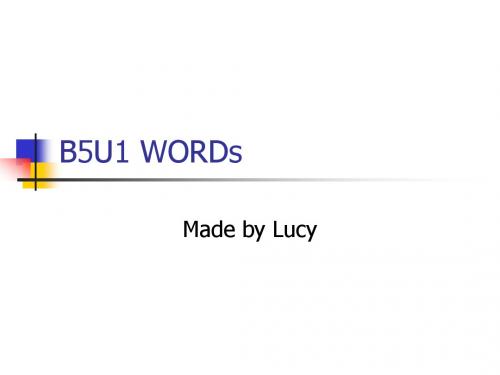
1. John put________ a suggestion that people not be exposed off to polluted water. 2. Our sports meeting has been put up __________till next month because of out the bad weather. with 3. They put ________ a notice there saying “Keep off the grass”. forwa 4. The fire was put ________ finally with rd the help of the firefighters. 5. How can you put up _______ such a
Conclude有关练习
thcome to ________ conclusion 1. We have e that the conclu company has been making great progresssion these months. reached the 2. Don’t jump to a __________(conclude) conclusion that before considering all the facts, or you In be easily taken in. may conclusio 3. Many experts concluded his speech n _________________________________ with __(得出结论)many diseases are linked to smoking.
(完整版)人教版高中英语必修五Unit1知识点详解

必修5 Unit1 Great scientistsPart 1. Warming up1.explain及物动词(vt.)解释;说明;阐明[(+to)][+wh-][+(that)]He explained that he had been cheated. 他解释说他是上当受骗了。
Can you explain how the machine operates?你能解释一下这机器是如何运转的吗?Please explain this rule to me.请给我讲解一下这条规则。
不及物动词(vi.)解释;说明;辩解I've got to explain about it. 我得解释一下此事。
2.characteristicn. 特征;特性Kindness is one of his characteristics.adj. 独特的I heard my friend’s characteristic laugh.be characteristic of sb./sth. 是.....的特性Such bluntness is characteristic of hin. 如此迟钝是他的特性。
3. Who put forward a theory about black holes?put forward 提出(建议等);提名;提前,把时钟往前拨He put forward a new plan. 他提出一个新计划。
May I put your name forward as a possible chairman of the committee?我能否提名你当委员会主席?[归纳拓展]put down 记下;镇压put out 关掉;熄灭put aside 放在一边;储存;保留put off 推迟;延期put up 建造;举起;张贴put on 穿上put away 收好选词填空(put off, put up, put forward, put aside, put out)①The plan that you _____ at the meeting is wonderful.②Many tall buildings were _____ along the road.③Firefighters have been called to _____ the fire in the city center.④He has a little money to _____ for a rainy day.⑤Don’t _____ until tomorrow what can be done today.Part 2. Pre-reading, reading and comprehending1. Do you know how to prove a new idea in scientific researchhow to prove a new idea 为“疑问词+不定式”结构,该结构可在句中作主语、宾语、表语等。
新课标人教版必修五Book5 Unit1 复习
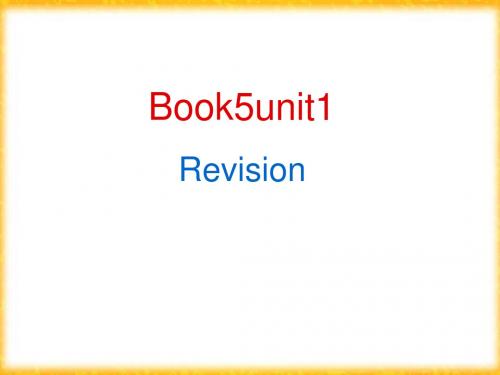
Preview(预习案):Key words: (写出下列单词 短语) 1. characteristic n.特征;特性 2. conclude vt. & vi.结束;推断出→ conclusion n.结论;结束 3. defeat vt.打败;战胜;使受挫 n.失败( 过 去式,分词 defeated,defeated ) 4. attend vt.照顾;护理;出席;参加 5. expose vt.暴露;揭露;使曝光 6. cure n.治愈;痊愈 vt.治愈;治疗 7. challenge n.挑战 vt.向……挑战 →challenger n.挑战者 8. absorb vt.吸收;吸引;使专心
17. construct vt.建设;修建→ construction 18. contribute vt. & vi.捐献;贡献;捐助 →contribution n.贡献 make a contribution to 19 科学的 scientific 20 分析 analyse 21 医生,内科医师 physician 22 受害者 victim 23 询问 enquiry 24 附近,邻近 neighbourhood 25 严重的,剧烈的 severe
10面对挑战 face the challenge
11 对……产生兴趣 become interested in 12 被传染的人 the affected person 13 霍乱的起因 the cause of cholera
14 进一步的调查 make further investigations
6. In another part of London, he found supporting evidence from two other deaths that were linked to the Broad street outbreak. 在伦敦的另一个地区,他与两个与宽街爆发的霍乱有关联 的死亡病例中又发现了有力证据。 7. A woman, who had moved away from Broad street, liked the water from the pump so much that she had it delivered to her house every day. 有一位妇女是从宽街搬来的,他特别喜欢那里的水,每天 都要派人从水泵打水运到家里来。 8.With this extra evidence John Snow was able to announce with certainty that polluted water carried the virus. 有了这个特别的证据,约翰.斯诺就能够肯定地宣布,这 种被污染了的水携带着病菌。
新人教英语必修五unit1词汇及语法解析

人教新课标必修五unit1词汇及语法解析1. characteristic用作名词,意思是“特点;特征;特性”与feature意思相近。
它也可用作形容词意为“典型的;具有…的特点的”。
Traffic jams are a characteristic of large cities. 堵车是大城市的特点。
The smell is characteristic of garlic. 这气味是大蒜的特点。
He speaks with characteristic passion. 他以特有的热情说话。
2. put forward的意思是“提出主意、计划(offer, suggest , an idea)等”。
He often puts forward some useful advice. 他常常提出一些有用的建议。
〖帮你归纳〗put的常用词组有:put aside节省(钱、时间);储蓄;把……放在一边put away储存(钱);放好put back拨慢;搁置put down放下;记下;击败;使(飞机)着陆;put off延期;推迟put on上演;穿上;戴上put out熄灭;关掉;扑灭put through接通电话;完成put up with忍受;忍耐put into action/effect/practice实施;实行3. examine的意思是“检查;审查;诊察;考察;测验”。
The doctor examined her carefully.医生仔细地给她作了检查。
The teacher examined the students on the book they read. 老师就学生读的书考学生。
examine指的是仔细观察以了解或发现什么东西,也可用于医生检查病人,以书面或口头的形式考察学生的知识与能力。
check指的是通过检查以确保某事物正确、安全、满意或处于良好状态,核对,核实某物等。
人教版高中英语必修五第一单元课件
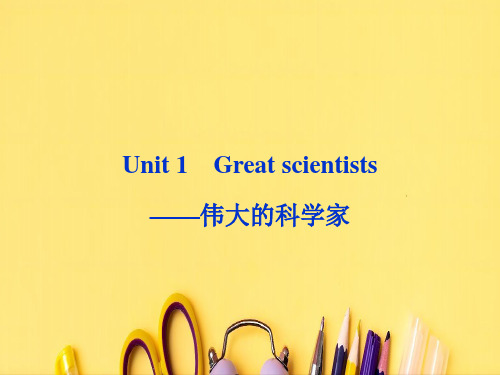
Unit 1 Great scientists——伟大的科学家
4 . prevent...from doing sth. 防 止 / 阻 止 ……做某事; suggest(建议)+宾语从句 _T_o__p_r_e_v_e_n_t _th__is_f_r_o_m__h_a_p_p_e_n_i_n_g__(为防 止这种情况发生)again,John Snow suggested that the source of all the water supplie _b_e_e_x_a_m__i_n_e_d___(被检测).
解析:选B。考查非谓语动词。根据 语境可知,felt与protect之间是被动关 系,排除选项A和C;和父亲一起的徒 步旅行已经结束,排除选项D。
栏目 导引
Unit 1 Great scientists——伟大的科学家
3 . (2012·北 京 东 城 期 末 )Lady Gaga
has put off her concerts because of the
栏目 导引
Unit 1 Great scientists——伟大的科学家
10.____b_e__a_g_a_in_s_t____ 反对 11.__(_b_e_)_s_tr_i_c_t_w_i_t_h_.._. 对……严格的 12.__b_e_t_o_b_l_a_m__e_____ 应受责备
栏目 导引
Unit 1 Great scientists——伟大的科学家
Unit 1 Great scientists ——伟大的科学家
栏目 导引
Unit 1 Great scientists——伟大的科学家
基础盘点自测自评
核心单词
1.The writer was so ___a_b_so_r_b_e_d___ ( 专心于)in her work that she didn’t notice Jim enter the room.
人教版 高中英语必修五:Unit1 Great scientists

Great scientists
Reading
Pre-reading
1.What impresses you most in 2003?
Which person impresses you most during the SARS?
What other infectious diseases do you know?
no wayຫໍສະໝຸດ (俚语)没门, 别想feel one’s way
摸黑走, 谨慎从事
on one’s way to… 在去…的路上
in this way=by this means=with this method 用这种方法
2.Who put forward a theory about black holes?
I don’t like the way __(_th__a_t/_i_n__w_h_i_c_h_) you
speak to your father. 我不喜欢你跟你父亲讲话的方式.
与way相关的短语:
by the way
顺便说
by way of … lose one’s way
通过…的方法 迷路
2. Who wrote a book
explaining how animals
and plants developed as
the environment changed? Charles Darwin (1808-1882) British author of The Origin of Species
C.He got interested in two theories that possibly explained how cholerakilled people
人教版高中英语必修五Unit 1 Great scientists 1.1
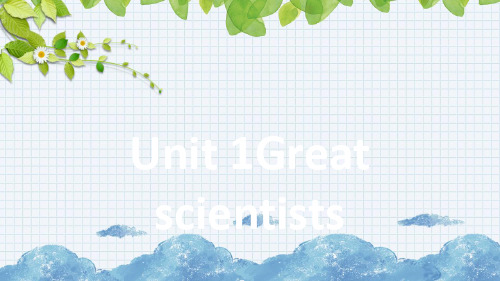
Section Ⅰ Warming Up,Pre-
一二三 四五
一、词义匹配
A
B
1.suspect a.to tell people something about a decision,plans,etc.
2.blame b.to deal with a situation,or a person
Unit 1Great scientists
【文章导语】 Have you heard of Newton,a famous scientist?There are many interesting stories about him.Here is one.
你听说过著名科学家牛顿吗?关于他,有许多有趣的故事。下面 就是其中之一。
adj.受污染的
一二三 四五
四、阅读课文JOHN SNOW DEFEATS “KING CHOLERA”,回
答下列问题
1.According to John Snow’s view,
.
A.Queen Victoria suffered a lot from bad health
B.a cure had been found for cholera before his time
C.cholera’s cause had to be discovered in order to control it
D.thousands of terrified people knew what they should do
答案:C
一二三 四五
2.Which of the following theories did John Snow believe in?
人教版高中英语必修五教材(全册)

人教版高中英语必修五教材(全册)本教材分为六个单元,内容涵盖了语法、词汇、阅读、写作等多个方面,旨在帮助学生综合提高英语能力。
下面是各单元的主要内容概括:Unit 1: Great Scientists介绍了几位杰出的科学家,如达尔文、爱因斯坦等,并探讨了科学和技术的发展。
通过阅读科学家的传记,学生们可以研究到科学家的职业生涯,从而了解科学是如何不断进步的。
Unit 2: The Environment本单元主要围绕环保展开。
内容包括环境问题、环境保护、可持续发展等话题的讨论。
通过这些话题的研究,学生们可以了解到我们面临的环境问题以及如何保护环境。
Unit 3: Music介绍了各种类型的音乐,包括古典音乐、摇滚音乐、流行音乐等,并通过音乐相关话题组织研究活动。
此外,还有关于音乐史和音乐家传记的阅读材料,使学生对音乐有更全面的了解。
Unit 4: Films and TV介绍了电影和电视节目的类型,如喜剧、动作片、纪录片等,并展开了有关电影制作和电视节目制作的话题。
通过与电影电视有关的材料,如影评、采访等,学生们可以提高听、说、读写各方面的能力。
Unit 5: Inventors and Inventions介绍了一些伟大的发明家和他们的发明,如爱迪生、贝尔等。
通过了解这些发明家的生平及其发明,学生们可以更好地理解科技与人类社会的发展历程。
Unit 6: Health围绕健康话题展开,包括饮食惯、锻炼、心理健康等。
同时,还有关于一些健康问题和疾病的介绍,如艾滋病、癌症等。
通过这些话题的研究,学生们可以了解到如何保持一个健康、积极的生活方式。
整本教材主要采用了趣味性、实用性和交际性的教学方法,旨在引导学生尽早进入英语学习环节,从而提高自己的听说读写能力。
人教版高中英语必修5
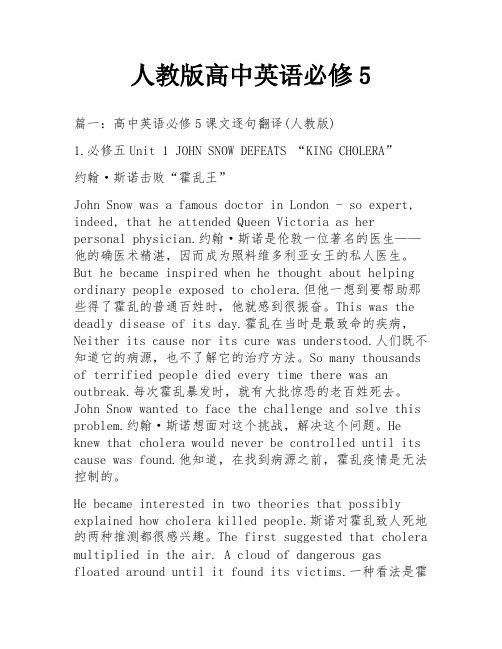
人教版高中英语必修5篇一:高中英语必修5课文逐句翻译(人教版)1.必修五Unit 1 JOHN SNOW DEFEATS “KING CHOLERA”约翰·斯诺击败“霍乱王”John Snow was a famous doctor in London - so expert, indeed, that he attended Queen Victoria as her personal physician.约翰·斯诺是伦敦一位著名的医生——他的确医术精湛,因而成为照料维多利亚女王的私人医生。
But he became inspired when he thought about helping ordinary people exposed to cholera.但他一想到要帮助那些得了霍乱的普通百姓时,他就感到很振奋。
This was the deadly disease of its day.霍乱在当时是最致命的疾病,Neither its cause nor its cure was understood.人们既不知道它的病源,也不了解它的治疗方法。
So many thousands of terrified people died every time there was an outbreak.每次霍乱暴发时,就有大批惊恐的老百姓死去。
John Snow wanted to face the challenge and solve this problem.约翰·斯诺想面对这个挑战,解决这个问题。
He knew that cholera would never be controlled until its cause was found.他知道,在找到病源之前,霍乱疫情是无法控制的。
He became interested in two theories that possibly explained how cholera killed people.斯诺对霍乱致人死地的两种推测都很感兴趣。
- 1、下载文档前请自行甄别文档内容的完整性,平台不提供额外的编辑、内容补充、找答案等附加服务。
- 2、"仅部分预览"的文档,不可在线预览部分如存在完整性等问题,可反馈申请退款(可完整预览的文档不适用该条件!)。
- 3、如文档侵犯您的权益,请联系客服反馈,我们会尽快为您处理(人工客服工作时间:9:00-18:30)。
人教版高中必修五Unit one Great Scientists教学目标:1 掌握本单元重点词汇2 过去分词做表语和定语的用法教学内容重点词语1.put forward 提出(建议,理论,计划等)Who put forward a theory about black holes?He put forward a new plan.2.draw a conclusion 得出结论draw a conclusion=come to a conclusion=arrive at a conclusion in conclusion 总之the conclusion of …..的结论eg: the conclusion of the trade talksv:conclude 结束,推断出eg He conclude his speech with some amazing words.(结束)The police concluded that he was the murderer.(推断出)3.Analyse the resultThe teacher asked us to analyse the text in detail.We are going to analyse what went wrong.4.defeatn: a 7-0 defeat an election defeat suffer a defeatv: Our team defeated class 3.5.Expertn: an expert with the computer;an agricultural expertadj: an expert rider; an expert opinionbe expert at=be good at He is an expert at driving the car. 6.AttendThe little baby was attended by his father.All club members are quested to attend the meeting.Attend the class/the meeting/church7.Expose(to)Don’t expose yourself to the sun for too long.8.Curen: Doctors claimed to have discovered a cure for the disease.V:I was cured with this medicine.9.challengen: face the challenge;take up the challengev: He challenged me to a game of tennis.10.suggestThe first suggested that cholera multiplied in the air.(暗示,表明) The disorganized meeting suggested bad preparation.To prevent this from happening again,John Snow suggested that the source of all the water suppliers be examined.(建议) I suggested that he should give up smoking.I suggest leaving early for the airport.注意suggest 常用的有两种意思,当意思为建议时,常用在句型suggest(that)somebody(should)do;另外,后面还可直接加-ing形式。
当意思为暗示时,后面该用什么时态就用什么时态。
11.absorbThe big company gradually absorbed these small companies into its own organization.I was so interested in these new ideas that I absorbed them withoutthinking.12.suspectvt:Do you have reason to suspect his motives?He is suspected of murder.n:After 3 hours of questioning ,the suspect broke down and confessed.13.be to blameI think it’s fair to say that she was (not) to blame for the accident.V:It’s not fair to blame him,for he didn’t know anything.n: I always get the blame for his mistake.14.PolluteThe government should close some companies that pollute the environment.n:pollution15.handlen:a brush with a long handle;a door handlev:He handled the problem with great diplomacy.16.Link(link….to…..)V:Fingerprints linked the suspect to the crime.A highway linking two major citiesn:China should try to develop closer links with the rest of the world.17.announceWe are sorry to announce the cancellation of the flight to Shanghai.18.Instruct(命令,指示,教导)The water companies were instructed not to expose people to polluted water any more.(命令)He instructed me to deliver the things to the customer.(instruct sb to do sth)We instruct the children in basic reading skills.Instruction:He gives us instructions in English.19.be strict with sb in sthMy father is strict with me in everything.20.Contribute(to)Your ideas will contribute to solving this problem.He contributed a lot money to the charity.n contributionThe UN has made an important contribution to world peace.(make a contribution to)21.ConstructV:construct a square on this linen:Several new offices are under construction.22.apart fromApart from being short,he is smart.Apart from the cost,it will cost a lot of meney.23.make senseThe sentence didn’t make any sense to me.I didn’t think the sentence make sence.=I think the sentence makeno sense.24.movementsa movement away from traditional valuesI have a broken neck,so movement is quite impossible.V:moveVt The movie moves many people(感动)Please help me move the stoneVi we are going to move to the new house.25.spin(使旋转;纺纱或线)The door is spinning.Spin cotton,spin yarn26.rejectHe rejected our suggestions.They rejected the apples that are overripe.27.enthusiasticTom was enthusiastic about the place.28.CautiousI have been very cautious about giving my address to strangers. 二单元语法过去分词做表语和定语分词分为过去分词和现在分词,通常情况下,过去分词表被动和完成,现在分词表主动和进行。
分词在句子中常充当形容词和副词的作用。
1过去分词作定语English is a widely used language.This is one of the buildings built in 1980s.单个过去分词作定语常放在被修饰词的前面,过去分词短语作定语常放在被修饰词的后面。
练习Did you attend the meeting ____ yesterday?A.to be held B held C held D being held2.过去分词做表语1)用作表语的过去分词被动意味很强,主要表示被动与完成,相当于相容词。
注意区分:被动语态的过去分词动作意味强,主语为动作的承受者。
Eg The glass is broken.The glass was broken by Tom.The window are closed.The window was closed by Jack.2)表示感觉流露的一些过去分词(如surprised,exciteded,frightened,shocked)和一些过去分词(如dressed,drunk,lost,known,devoted等),常用作表语,有些仅表示状态,毫无被动意味。
